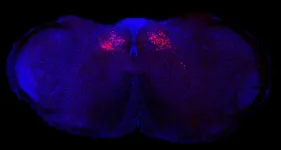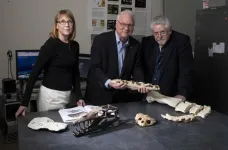(Press-News.org) Philadelphia, May 1, 2024 – Researchers from Children’s Hospital of Philadelphia (CHOP) have identified a causal genetic variant strongly associated with childhood obesity. The study provides new insight into the importance of the hypothalamus of the brain and its role in common childhood obesity and the target gene may serve as a druggable target for future therapeutic interventions. The findings were published today in the journal Cell Genomics.
Both environmental and genetic factors play critical roles in the increasing incidence of childhood obesity. While the exact role of genetics in childhood obesity is still not fully understood, prior studies show that neuronal pathways in the hypothalamus control food intake and are key regulators for the disease.
Prior international genome-wide association studies (GWAS) led by CHOP investigators found specific genetic markers, or loci, linked with obesity. Most of these studies revealed loci associated with childhood and adult obesity in equal measure, and most of these loci have been in non-coding regions of the genome, which means they do not code for specific proteins, making their mechanisms much more difficult to study. This latest research focused on chr12q13, a locus harboring the nearby gene FAIM2 that generated a strikingly stronger signal with childhood obesity when compared to adult obesity.
“By focusing specifically on this locus, we were able to pinpoint a causal variant associated with one of the strongest genetic signals we have implicated in childhood obesity,” said first study author Sheridan H. Littleton, PhD, a postdoctoral research associate who conducted this work as a member of the Center for Spatial and Functional Genomics team at CHOP. “With more research, there’s potential to learn how the target of this variant’s action may be a target for new therapies specifically designed to treat childhood obesity.”
In addition to childhood obesity, the locus in question has been found to be connected to a variety of related health issues, including elevated type 2 diabetes susceptibility, increased body fat percentage in children and adults, and earlier age of menstruation. Using a variety of techniques, the researchers narrowed their focus on rs7132908, a single nucleotide polymorphism (SNP), or variant, at the locus.
Prior related CHOP research implicated the hypothalamus in appetite, a trait that could be linked to childhood obesity. Since the hypothalamus is deep inside the brain, it is particularly challenging to study. To further study the effects of the rs7132908 variant, the researchers used stem cells that evolve into hypothalamic neurons, a key cell type associated with eating behavior, to study the variant’s alleles. The allele associated with obesity risk influenced how the FAIM2 gene was expressed and decreased the proportion of neurons produced when the stem cells differentiated, suggesting that the variant is also associated with neurodevelopment.
“In spite of a series of challenges, a study like this demonstrates how extra effort can reveal important information about hitherto uncharacterized genetic variants and the role they play in a variety of childhood and adult illnesses,” said Struan F.A. Grant, PhD, Director of the Center for Spatial and Functional Genomics and the Daniel B. Burke Endowed Chair for Diabetes Research at CHOP. “This work further underscores how the brain is central to the genetics of obesity and provides us with a strategy for further study.”
This study was supported by the Eunice Kennedy Shriver National Institute of Child Health and Human Development grants F31 HD105404 and R01 HD056465, the National Institute of Diabetes and Digestive and Kidney Diseases grant UM1 DK126194, and the Daniel B. Burke Endowed Chair for Diabetes Research.
Littleton et al, “Variant-to-function analysis of the childhood obesity chr12q13 locus implicates rs7132908 as a causal variant within the 3’ UTR of FAIM2.” Cell Genom. Online May 1, 2024. DOI: 10.1016/j.xgen.2024.100556
About Children’s Hospital of Philadelphia:
A non-profit, charitable organization, Children’s Hospital of Philadelphia was founded in 1855 as the nation’s first pediatric hospital. Through its long-standing commitment to providing exceptional patient care, training new generations of pediatric healthcare professionals, and pioneering major research initiatives, the hospital has fostered many discoveries that have benefited children worldwide. Its pediatric research program is among the largest in the country. The institution has a well-established history of providing advanced pediatric care close to home through its CHOP Care Network, which includes more than 50 primary care practices, specialty care and surgical centers, urgent care centers, and community hospital alliances throughout Pennsylvania and New Jersey, as well as the Middleman Family Pavilion and its dedicated pediatric emergency department in King of Prussia. In addition, its unique family-centered care and public service programs have brought Children’s Hospital of Philadelphia recognition as a leading advocate for children and adolescents. For more information, visit https://www.chop.edu.
END
CHOP researchers identify causal genetic variant linked to common childhood obesity
Target gene could serve as the basis of a future therapeutic intervention
2024-05-01
ELSE PRESS RELEASES FROM THIS DATE:
UVM scientists decode exercise's molecular impact
2024-05-01
BURLNGTON, Vt.—For the past eight years, researchers have been conducting a groundbreaking study supported by the National Institutes of Health (NIH) Common Fund: The Molecular Transducers of Physical Activity Consortium (MoTrPAC). With nearly 2,600 volunteers, the study aims to examine the molecular effects of exercise on healthy adults and children, considering factors like age, race, and gender. The goal is to create comprehensive molecular maps of these changes and uncover why physical activity has significant health benefits.
“This ...
Differences in cardiovascular health at the intersection of race, ethnicity, and sexual identity
2024-05-01
About The Study: This cross-sectional study uses National Health and Nutrition Examination Survey data to examine differences in cardiovascular health metrics at the intersection of race, ethnicity, and sexual identity.
Authors: Nicole Rosendale, M.D., of the University of California San Francisco, is the corresponding author.
To access the embargoed study: Visit our For The Media website at this link https://media.jamanetwork.com/
(doi:10.1001/jamanetworkopen.2024.9053)
Editor’s Note: Please see the article for additional information, including other authors, author contributions and affiliations, conflict of interest and financial ...
Plant-based diets and disease progression in men with prostate cancer
2024-05-01
About The Study: Higher intake of plant foods after prostate cancer diagnosis was associated with lower risk of cancer progression, this study suggests.
Authors: Stacey A. Kenfield, Sc.D., of the University of California, San Francisco, is the corresponding author.
To access the embargoed study: Visit our For The Media website at this link https://media.jamanetwork.com/
(doi:10.1001/jamanetworkopen.2024.9053)
Editor’s Note: Please see the article for additional information, including other authors, author contributions and affiliations, conflict of interest and financial disclosures, and funding and support.
# # #
Embed this ...
Columbia scientists identify new brain circuit in mice that controls body’s inflammatory reactions
2024-05-01
NEW YORK, NY — The brain can direct the immune system to an unexpected degree, capable of detecting, ramping up and tamping down inflammation, shows a new study in mice from researchers at Columbia's Zuckerman Institute.
"The brain is the center of our thoughts, emotions, memories and feelings," said Hao Jin, PhD, a co-first author of the study published online today in Nature. "Thanks to great advances in circuit tracking and single-cell technology, we now know the brain does far more than that. It is monitoring the function of every system in the body."
Future ...
Nutrient research reveals pathway for treating brain disorders
2024-05-01
A University of Queensland researcher has found molecular doorways that could be used to help deliver drugs into the brain to treat neurological disorders.
Dr Rosemary Cater from UQ’s Institute for Molecular Bioscience led a team which discovered that an essential nutrient called choline is transported into the brain by a protein called FLVCR2.
“Choline is a vitamin-like nutrient that is essential for many important functions in the body, particularly for brain development,” Dr Cater said.
“We need to consume 400-500 mg of choline ...
Nationwide, 6 stroke advocates selected to receive 2024 Stroke Hero Awards
2024-05-01
DALLAS, May 1, 2024 — Each year, approximately 800,000 people in the U.S. have a stroke.[1] Six local stroke heroes from across the country are being recognized by the American Stroke Association, a division of the American Heart Association, for their resiliency and dedication in the fight against stroke.
The American Stroke Association’s annual Stroke Hero Awards honors stroke survivors, health care professionals, advocates and caregivers. During May, American Stroke Month, the Association, ...
Sleep resets brain connections – but only for first few hours
2024-05-01
During sleep, the brain weakens the new connections between neurons that had been forged while awake – but only during the first half of a night’s sleep, according to a new study in fish by UCL scientists.
The researchers say their findings, published in Nature, provide insight into the role of sleep, but still leave an open question around what function the latter half of a night’s sleep serves.
The researchers say the study supports the Synaptic Homeostasis Hypothesis, a key theory on the purpose of sleep which proposes that sleeping acts as a reset for the brain.
Lead author Professor Jason Rihel (UCL Cell & Developmental Biology) said: “When we are awake, ...
Rock solid evidence: Angola geology reveals prehistoric split between South America and Africa
2024-05-01
DALLAS (SMU) – An SMU-led research team has found that ancient rocks and fossils from long-extinct marine reptiles in Angola clearly show a key part of Earth’s past – the splitting of South America and Africa and the subsequent formation of the South Atlantic Ocean.
With their easily visualized “jigsaw-puzzle fit,” it has long been known that the western coast of Africa and the eastern coast of South America once nestled together in the supercontinent Gondwana — which broke off from the larger landmass of Pangea.
The research team says the southern coast of Angola, where they dug up the samples, arguably provides the most complete ...
Life expectancy in two disadvantaged areas higher than expected
2024-05-01
Better than expected life expectancy in two disadvantaged areas in England is probably due to population change according to local residents and professionals.
In the UK, people from the most disadvantaged areas can expect to die nine years earlier compared with people from the least disadvantaged areas while people in the north of England have lower life expectancy, higher infant mortality and worse health and wellbeing compared with national averages.
The study, funded by the NIHR School for Public Health Research, was a collaboration between Lancaster University, ...
Dynamic DNA structures and the formation of memory
2024-05-01
An international collaborative research team, including scientists from UQ’s Queensland Brain Institute (QBI), has discovered a novel mechanism underlying memory involving rapid changes in a specific DNA structure.
The team found that G-quadraplex DNA (G4-DNA) accumulates in neurons and dynamically controls the activation and repression of genes underlying long-term memory formation.
In addition, using advanced CRISPR-based gene editing technology, the team revealed the causal mechanism underlying the regulation ...
LAST 30 PRESS RELEASES:
Brain cells drive endurance gains after exercise
Same-day hospital discharge is safe in selected patients after TAVI
Why do people living at high altitudes have better glucose control? The answer was in plain sight
Red blood cells soak up sugar at high altitude, protecting against diabetes
A new electrolyte points to stronger, safer batteries
Environment: Atmospheric pollution directly linked to rocket re-entry
Targeted radiation therapy improves quality of life outcomes for patients with multiple brain metastases
Cardiovascular events in women with prior cervical high-grade squamous intraepithelial lesion
Transplantation and employment earnings in kidney transplant recipients
Brain organoids can be trained to solve a goal-directed task
Treatment can protect extremely premature babies from lung disease
Roberto Morandotti wins prestigious Max Born Award for pioneering research in quantum photonics
Scientists map brain's blood pressure control center
Acute coronary events registry provides insights into sex-specific differences
Bar-Ilan University and NVIDIA researchers improve AI’s ability to understand spatial instructions
New single-cell transcriptomic clock reveals intrinsic and systemic T cell aging in COVID-19 and HIV
Smaller fish and changing food webs – even where species numbers stay the same
Missed opportunity to protect pregnant women and newborns: Study shows low vaccination rates among expectant mothers in Norway against COVID-19 and influenza
Emotional memory region of aged brain is sensitive to processed foods
Neighborhood factors may lead to increased COPD-related emergency department visits, hospitalizations
Food insecurity impacts employees’ productivity
Prenatal infection increases risk of heavy drinking later in life
‘The munchies’ are real and could benefit those with no appetite
FAU researchers discover novel bacteria in Florida’s stranded pygmy sperm whales
DEGU debuts with better AI predictions and explanations
‘Giant superatoms’ unlock a new toolbox for quantum computers
Jeonbuk National University researchers explore metal oxide electrodes as a new frontier in electrochemical microplastic detection
Cannabis: What is the profile of adults at low risk of dependence?
Medical and materials innovations of two women engineers recognized by Sony and Nature
Blood test “clocks” predict when Alzheimer’s symptoms will start
[Press-News.org] CHOP researchers identify causal genetic variant linked to common childhood obesityTarget gene could serve as the basis of a future therapeutic intervention



